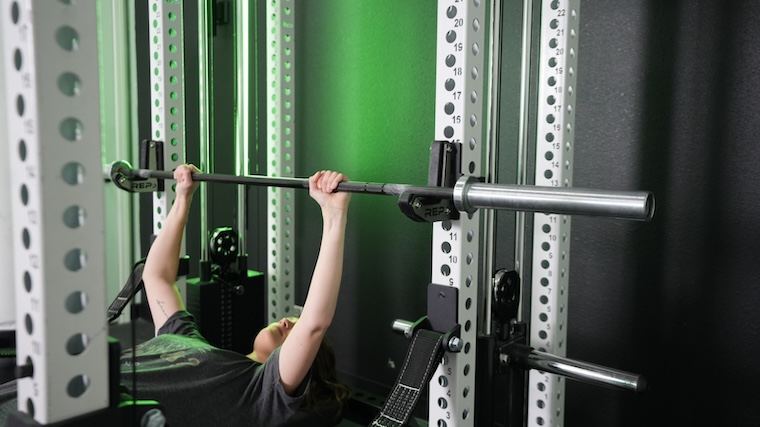Bodybuilders love their little rules. “Does your row grip matter?” — pitch that question to any science-based gymgoer and you’ll get an earful about biomechanics and optimized training techniques for hypertrophy.
To be fair, most of it is sound advice. But when it comes to the bench press and growing your chest, one interesting scientific study argued that your bench press grip of choice doesn’t have much of an impact on overall chest hypertrophy.

[Related: Best Bodybuilding Supplements for Muscle Growth]
Conventional gym bro wisdom suggests that a close-grip bench press emphasizes the triceps and shoulders, while using a wider grip is better for isolating the chest. Is that accurate? Let’s take a look at what the paper actually says and see if we can glean any actionable insights from it before you dive into your next chest workout. Class is in session.
What the Study Says
The paper in question was published in 2021 and is titled “The Effect of Grip Width on Muscle Strength and Electromyographic Activity in Bench Press among Novice- and Resistance-Trained Men” by Saeterbakken & colleagues. (1) Here’s a breakdown of the methods, findings, and limitations of their data:
Methods
The authors assembled two groups of male participants; “resistance-trained” individuals who had one or more years of “continuous” strength training experience and the ability to bench at least 125% of their own weight.
The other group were “novice-trained” men who needed to have some level of familiarity with the bench press, but who did not engage in any lifting in the last six months.
- The two groups performed a six-repetition-maximum test while using a narrow, medium, and wide bench press grip.
- Electromyographic (EMG) nodes placed on the subjects recorded activation levels in various upper-body muscles.
Findings
- Among the subjects with gym experience, the researchers observed “significantly greater” triceps EMG when they performed the bench press using a medium grip.
- The “untrained” group had more shoulder activation when benching with a medium grip than a narrow grip.
- Participants experienced greater biceps activation with wider bench press grips than narrow grips.
- The authors did not observe or remark on any significant differences in pectoral EMG between groups or between variations of the bench press.
The clinicians over at Stronger by Science did a fantastic breakdown of this paper in a Jul. 11 Instagram post, which we’ve included just below. Of note, they remark that the effect sizes in muscle activation weren’t “particularly large” — in plain English, the differences between muscle activation as it relates to grip width don’t appear to be earth-shattering.
[Related: Spot Fat Reduction Is Real, but There’s a Catch]
Limitations
So, what can we interpret from this study? Frankly, not a whole lot, though it is thought-provoking. Let’s go over a few of the limitations to the work by Saeterbakken & Co:
- The study involved a relatively small and homogenous group of participants; 28 adult males in total.
- This paper does not constitute longitudinal research. Longitudinal studies measure changes or interactions over time, rather than in a single setting.
- The authors measured muscle activation via EMG, which is a practical but imperfect method of determining regional muscle activation.
In 2022, Vigotsky & colleagues published a paper titled “Acutely Measured Surface EMG Amplitude is not a Validated Predictor of Muscle Hypertrophy”, (2) and you can sort of discern the meaning of their research from the title alone.
- Vigotsky et al. allege that, “Given the limited evidence validating the amplitude of surface electromyograms … we suggest that acute comparative studies that wish to assess stimulus potency be met with scrutiny.”
Now, in fairness, Saeterbakken’s team did not make any strong statements about the impact of their research or findings on muscle hypertrophy. Still, it’s important to recognize that EMG, like most scientific instruments, isn’t practically useful in all situations.
What You Should Do
So, does this study shut the book on bench press bro-science? Not really. However, it’s a resource that merits consideration.
- The paper seems to suggest what most gymgoers intrinsically know: beginner bodybuilders struggle with establishing a mind-muscle connection in their chests.
- Does that mean the bench press isn’t a good chest exercise if you can’t “feel” it? Not necessarily.
- You probably shouldn’t overthink your bench press grip too much to begin with. Given the small effect sizes noted in this paper, a wide-grip and close-grip bench press challenge your upper body in pretty similar ways.
- Bench press with whatever grip you find comfortable and sustainable. In the long run, you’ll probably make better gains by adjusting your form such that the exercise isn’t uncomfortable or awkward to perform.
[Related: Best Pre-Workout Supplements for Bodybuilding]
More Research Content on BarBend
- Can Swishing Sugary Drinks in Your Mouth Increase Strength?
- Are Today’s Children Weaker Than Previous Generations?
- Overhead Triceps Extensions Build More Muscle Than Pressdowns
References
- Saeterbakken AH, Stien N, Pedersen H, Solstad TEJ, Cumming KT, Andersen V. The Effect of Grip Width on Muscle Strength and Electromyographic Activity in Bench Press among Novice- and Resistance-Trained Men. Int J Environ Res Public Health. 2021 Jun 14;18(12):6444. doi: 10.3390/ijerph18126444. PMID: 34198674; PMCID: PMC8296276.
- Vigotsky AD, Halperin I, Trajano GS, Vieira TM. Longing for a Longitudinal Proxy: Acutely Measured Surface EMG Amplitude is not a Validated Predictor of Muscle Hypertrophy. Sports Med. 2022 Feb;52(2):193-199. doi: 10.1007/s40279-021-01619-2. Epub 2022 Jan 10. PMID: 35006527.
Featured Image: Max Kegfire / Shutterstock